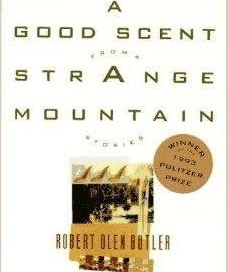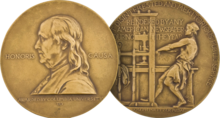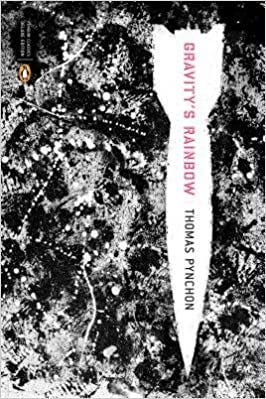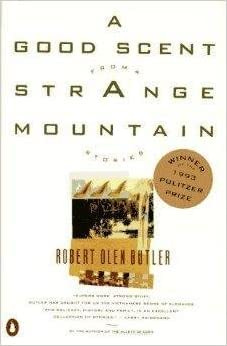In my Chicago Tribune column this week, I attempt to “predict” the winner of this year’s Pulitzer Prize in fiction.1 For some reason, the Pulitzer organization is coy about the precise date the awards will be announced, but it’s always sometime in April.
“Predict” is in quotes because the reality is that I am guessing. It is impossible to predict what book is going to win a prize like this. There is no formula, no algorithm, no Moneyball-like analysis that can tell you what book is going to win a prize.
This is particularly true for a prize like the Pulitzer, where a committee of three names three finalists, which are then voted on by the full Pulitzer board. Occasionally, this results in no prize being awarded, most recently in 2012 when Karen Russell’s Swamplandia, David Foster Wallace’s posthumous novel, The Pale King, and the Denis Johnson novella Train Dreams, were named as finalists, but apparently no consensus winner could be reached.
The most famous example of no award is 1974 when Thomas Pynchon’s Gravity’s Rainbow was given an unanimous endorsement by the three-person jury, but the full committee chose to reject the recommendation and give no award instead.
Other times, the committee’s suggestion has simply been rejected, as in 1980 when Philip Roth’s The Ghost Writer was tapped by the jury, but the committee went with The Executioner’s Song by Norman Mailer.
(For more fiction Pulitzer controversies you can check out this 1984 New York Times article that I’ve used my subscription to gift access to all of you.)
Surprise choices seemingly out of the blue happen with enough frequency to inject a certain sense of randomness into the fiction Pulitzer.
Less (2018) by Andrew Sean Greer is a very charming comic novel, but it did not have “Pulitzer Prize” written all over it. Of course, given that the stated criteria, “For distinguished fiction by an American author, preferably dealing with American life,” is so broad, any book could fit under its umbrella. All the Light We Cannot See (2015) is one of the most widely loved novels of recent vintage, but its connection to American life is not apparent.
Tinkers (2010) by Paul Harding is perhaps the most unlikely Pulitzer winner of the era in which I know enough to make that claim. Originally published by tiny Bellevue Literary Press, the book was barely reviewed, but Harding has a pedigree as a graduate of the Iowa Writer’s Workshop and student of Marilynne Robinson (2005 winner for Gilead), so it’s explicable that such a book could get on a prize committee’s radar.
A Confederacy of Dunces (1981) took an even more unusual and unlikely path to winning a posthumous prize for author John Kennedy Toole. Toole committed suicide in 1969, leaving behind the novel manuscript. Years later, Toole’s mother, Thelma, decided to wage a campaign to bring the book to the attention of Walker Percy, who was faculty at Loyola University in New Orleans at the time. After much persistence from Thelma Toole, Percy read the book and took on the challenge of getting it published, ultimately finding a spot for it at Louisiana State University Press.
Another unlikely Pulitzer Prize played an important role in my own trajectory as a writer, and says something about the importance we place on literary prizes, even though there is a strong element of the random wrapped up in them.
Speaking to the New York Times about winning the 1993 prize for his collection of short stories, A Good Scent from a Strange Mountain, Robert Olen Butler said, "I had no warning, zero. It came as a total surprise, something remarkable and wonderful that hit with the abruptness of a bolt of bayou lightning."
Butler had been plying his trade as a novelist and short story writer since the 1980’s, following working as a translator during the Vietnam War, an experience that informed A Good Scent, a collection of stories primarily written from the points of view of post-war Vietnamese immigrants in the United States. He was a professor at McNeese St. University in Lake Charles, Louisiana, teaching his courses, and going to the computer every day to write, just as he wrote his early novels by longhand while riding the train from Long Island to Manhattan to work as an editor for an energy industry trade journal.
I’d read A Good Scent from a Strange Mountain prior to it winning the Pulitzer Prize because Butler was friends with one of my college creative writing professors at the University of Illinois, Philip Graham.2 Butler had come to campus to give a reading sometime in spring 1992, and while I don’t remember which story he read specifically, I was transfixed, and used some money I’d normally earmark for pizza to buy a copy at the end. At the time I wouldn’t have articulated a desire or plan to be a writer, even though writing was the only thing I was interested in, school-wise anyway, in college.
Fast forward to late 1993, by which time I’ve realized, thanks to working as a paralegal post-college for the Chicago office of Kirkland & Ellis, that I do not want to go to law school because after law school, the most likely outcome is becoming a lawyer3. I contact Philip Graham for advice on the whole process of applying to graduate school for creative writing, and he suggests I apply to McNeese St., where Robert Olen Butler, who has just won a Pulitzer Prize, is teaching in a small program with only 12 fiction writers enrolled at a time.
Because I was young, and delusional, I had my sights set on bigger game, namely the Iowa Writer’s Workshop and the University of Michigan, each with acceptance rates below 5%.
I did not get in to either of those places. I was accepted to another program out west, and was pretty sure I would pull the trigger and go, when arriving home from work one day, one of my roommates said that a guy named “Bob Butler” was on the phone for me.
I don’t remember the whole conversation, but on the other end was Robert Olen Butler, offering me a spot in the program at McNeese. I do recall him making a baseball analogy - Bob’s a big St. Louis Cardinals (Boo!) fan - that I was like a young pitcher with a good fastball who needed help developing his full array of pitches, and that he and McNeese would help with that development.
I was a little starstruck and flattered that he would call, rather than send a letter as the other program I’d been accepted to had done. The McNeese application had already been stunningly low on red tape, send 30 pages of fiction to the school, and that was that. These seemed like good signs.
I knew enough to say that I thought I should visit before accepting, and he said that was fine, to let him know my decision when I could. I flew to Lake Charles right around this time of year twenty-eight years ago, and was picked up by John Wood, a poet and director of the program, and the most brilliant person I would ever come to meet.4 John took me to the Crab Palace - the same place Bob was interviewed in by the Times - for lunch with him and Dave and Neil5 where a giant pile of fresh crawfish and crabs were deposited on the table in front of us, and I learned how to properly grapple with those crustaceans.6
After lunch, Dave and Neil took me to Billy Wayne’s, a bar allegedly owned by the illegitimate son of John Wayne, to shoot pool with Adam.7 From there we went to Adam’s where he made red beans and rice and we watched the NBA playoffs. Adam was a big Phoenix Suns (Boo!) fan.
I won’t say that Lake Charles felt like home, but it definitely felt like a place I could hang out and try to write for three years.
It was a good choice. While Bob Butler was understandably distracted by the opportunities that the Pulitzer had suddenly provided him, making him something of an absentee mentor, the way he articulated his view of creating fiction (articulated in his book From Where You Dream) had a permanent imprint on me. Spending time under the penumbra of John Wood’s mind is unforgettable, and the cohort of people I studied alongside was amazing.
And in truth, no amount of close attention or mentorship from a Pulitzer Prize winning author could have filled my bottomless need for validation, my desperation to have someone tell me that I was good enough, that I had the stuff to be a writer. Figuring out how to keep writing without that validation was probably the most important lesson I learned at the time, and continue to learn.
That need for validation actually played a role in going to McNeese in the first place. Having been rejected by the programs regular folks would have heard of, knowing that I could say that I was going to study under the guy who just won the Pulitze felt like a feather in my cap.
Ridiculous, in hindsight, but it’s a part of me I try to remember when working with students as an instructor with a decidedly less impressive resume, but who holds that power of validation over them regardless.
Who among us doesn’t crave some reassurance that we’re doing the right thing?
It was a shock to go back to that Times article and to realize that Bob was younger at the time I started as a graduate student than I am now. So much of this feels like it happened quite recently. In my mind, I can put myself back in the Crab Palace as though I was just there this afternoon. Lake Charles has had a bad stretch, devastated by a series of catastrophic storms, and general governmental neglect. Arlie Russell Hochschild’s Strangers in Their Own Land: Anger and Mourning on the American Right is an immersive look at the political and social dynamics that rule in a place like that, and is really one of the first books to pinpoint the tensions that the country is navigating today
I’ve had occasion to see Bob once or twice since graduation, but we’re not close or anything. He is also too prolific as an author for me to keep up with his full output. He has had numerous post-prize successes, but nothing that approaches a Pulitzer.
But what really could approach a Pulitzer? Winning a Pulitzer Prize is just about the ultimate validation for a writer, and it makes many things possible. I sometimes imagine what it would have been like to have had my first novel sell in numbers that made a second book commercially viable, or even better what if it had won some sort of prize?
The wisdom of experience now tells me that ultimately, as nice as the validation is, it truly doesn’t matter. It isn’t the fuel that makes the writing go, at least not for long. Bob put it better than I ever could in the conclusion of that Times article on him winning the prize.
So a long time ago I learned that the only way to avoid madness was to just turn on the computer every morning and do my work and not think about the prizes, the critics, how many readers there are. So then I'm in a position when this sort of thing happens, it comes as an absolute shock, on the one hand, and then on the other hand, to my deepest self it seems like the most natural thing in the world.
I turned on the computer and sat down to draft this post on a Friday at 3:30pm. It’s now 5:16 and I’m typing these words. There will be no prize at the end, but having this space, knowing there’s a couple of thousand of you out there who may read this is a very good way to avoid madness at least for the couple of hours I carved out for all this remembering and reflection.
Links
The International Booker Prize for a book in another language translated into English announced its shortlist of finalists, including The Books of Jacob by Olga Tokarczuk, and Heaven by Mieko Kawakami.
Jami Attenberg, author most recently of essay collection I Came All This Way to Meet You, offers a useful list of “10 Essential Books About Writing (Not by White Men).”
At Esquire, Matt Ortile offers a list of “25 Must Read Books by Queer Writers.
In book banning news, the American Library Association has released their list of most challenged books of 2021, while PEN America does a deep dive into the who, what, where, when, and why of these book bans.
The New York Times is recommending 12 books this week. Can you imagine how many books you’d have to read a year if you read every book recommended by the New York Times?
At Inside Higher Ed, yours truly points out the obvious about the AP Literature exam. It’s terrible.
Recommendations
All books linked here are part of The Biblioracle Recommends bookshop at Bookshop.org. Affiliate income for purchases through the bookshop goes to Open Books in Chicago.8
Affiliate income stands at $77.30 for the year.
1. Let My People Go Surfing by Yvon Chouinard
2. The Bad-Ass Librarians of Timbuktu by Joshua Hammer
3. Shadow City: A Woman Walks Kabul by Taran Khan
4. The Word is Murder by Anthony Horowitz
5. Dancing Bears: True Stories of People Nostalgic for Life Under Tyranny by Witold Szablowski
Madhuri S. - Aarhus, Denmark.
I’m feeling some W.G. Sebald for Madhuri, specifically the novel many consider his masterpiece, Austerlitz.
—
1. Charles Dickens: A Life By Jane Smiley
2. Mrs. Palfrey at the Claremont By Elizabeth Taylor
3. French Braid by Anne Tyler
4. The Lying Life of Adults by Elena Ferrante
5. Oh William! By Elizabeth Strout
Evelyn K.
These are all books that are just flat out good company, a notion that I’m going to be exploring in a future column at the Tribune. I’m concerned that this author’s work is falling out of print since his passing, but used and library copies should be available. The writer is Jon Hassler, and the book is Love Hunter.
I have acquired a truly stunning number of books to read in the last few weeks, so that’s what I’ll be doing as much as possible for the foreseeable future. This is just some of what I have on tap:
The Candy House by Jennifer Egan
Sea of Tranquility by Emily St. John Mandel
Let’s Not Do That Again by Grant Ginder
Search by Michelle Huneven
Mercy Street by Jennifer Haigh
What are you reading?
Have a good week,
John
The Biblioracle
Philip Graham was the kind of professor that every student deserves at least one of, someone invested in his students as humans, who take that part of the job seriously. I honestly don’t know what my life would have been without having the luck of winding up in his introductory fiction writing course.
No offense to the lawyers in the audience.
John Wood is worth several posts, or even a whole book by himself. An amazing character.
“Neil” is Neil Connelly a professor and writer who has gone on to publish a number of very fine books for both adults and young adults and who was also my first office mate.
The great pleasure John Wood took in sucking the head of the crawfish is something I will never forget.
Adam Johnson, who many years later would win a Pulitzer Prize (2013) for his novel, The Orphan Master’s Son.
I’ll match affiliate income up to 5% of annualized revenue for the newsletter, or $500, whichever is larger.







Not a writer; don't really understand the drive. But am intrigued by the ruminations over the process. And do enjoy your articles and recommendations.
Re: footnote #1, if it would only turn out to be true! (happy dance) You inspired me last year to start reading Everett and now I just can't get enough. I also proselytize quite a bit...